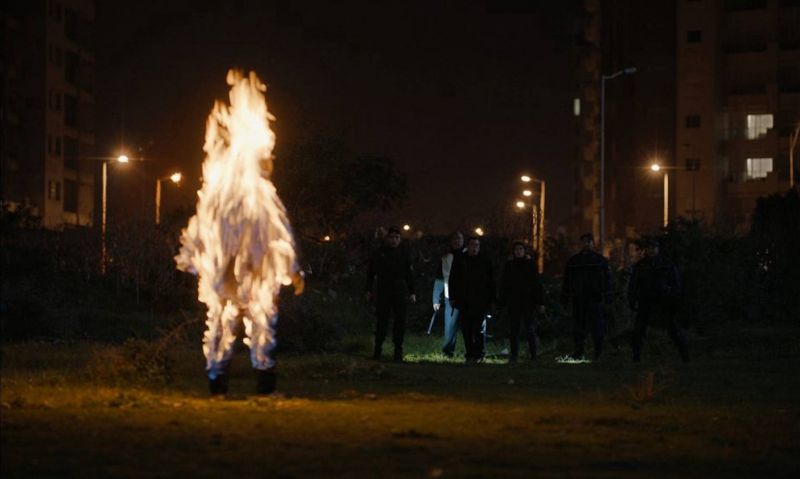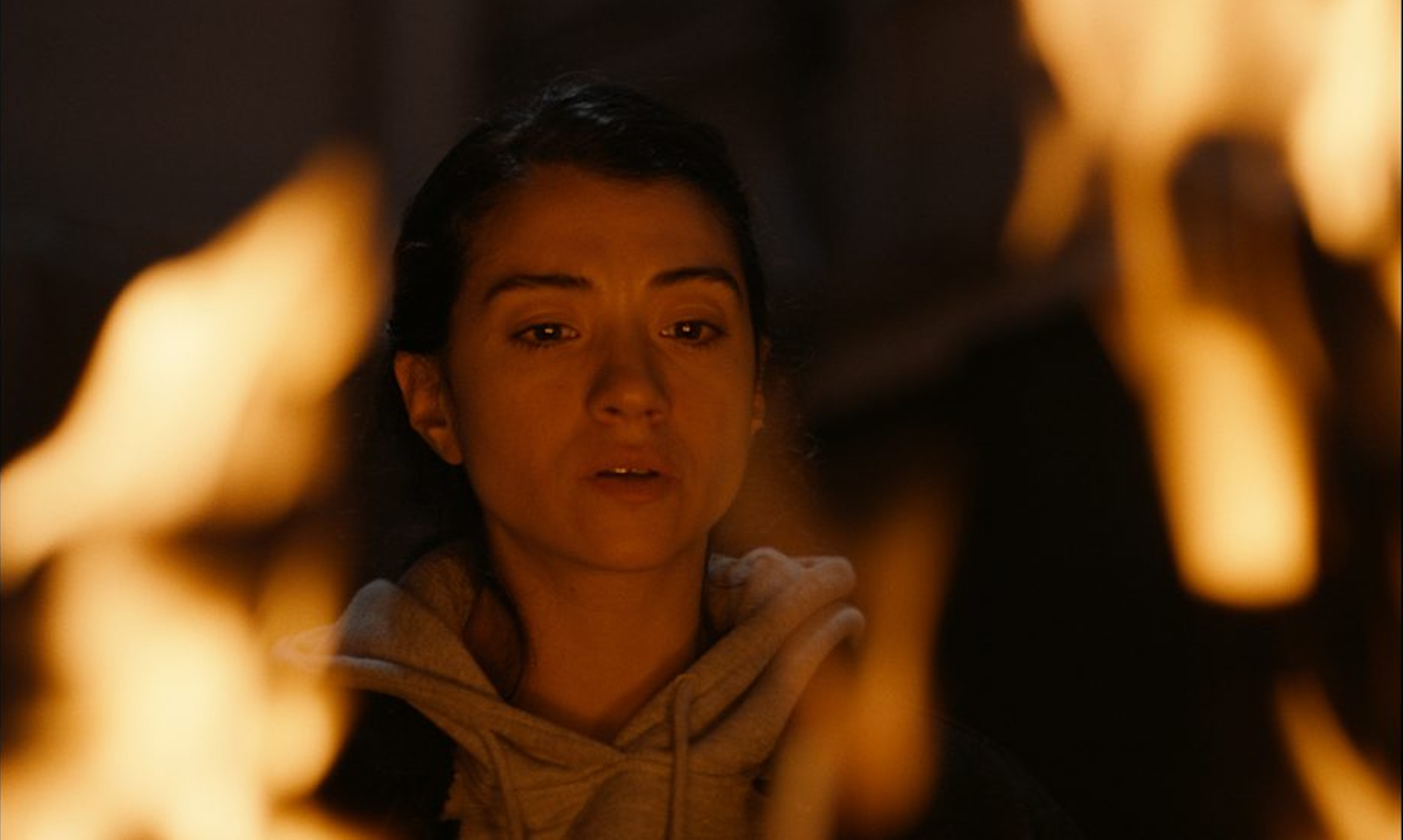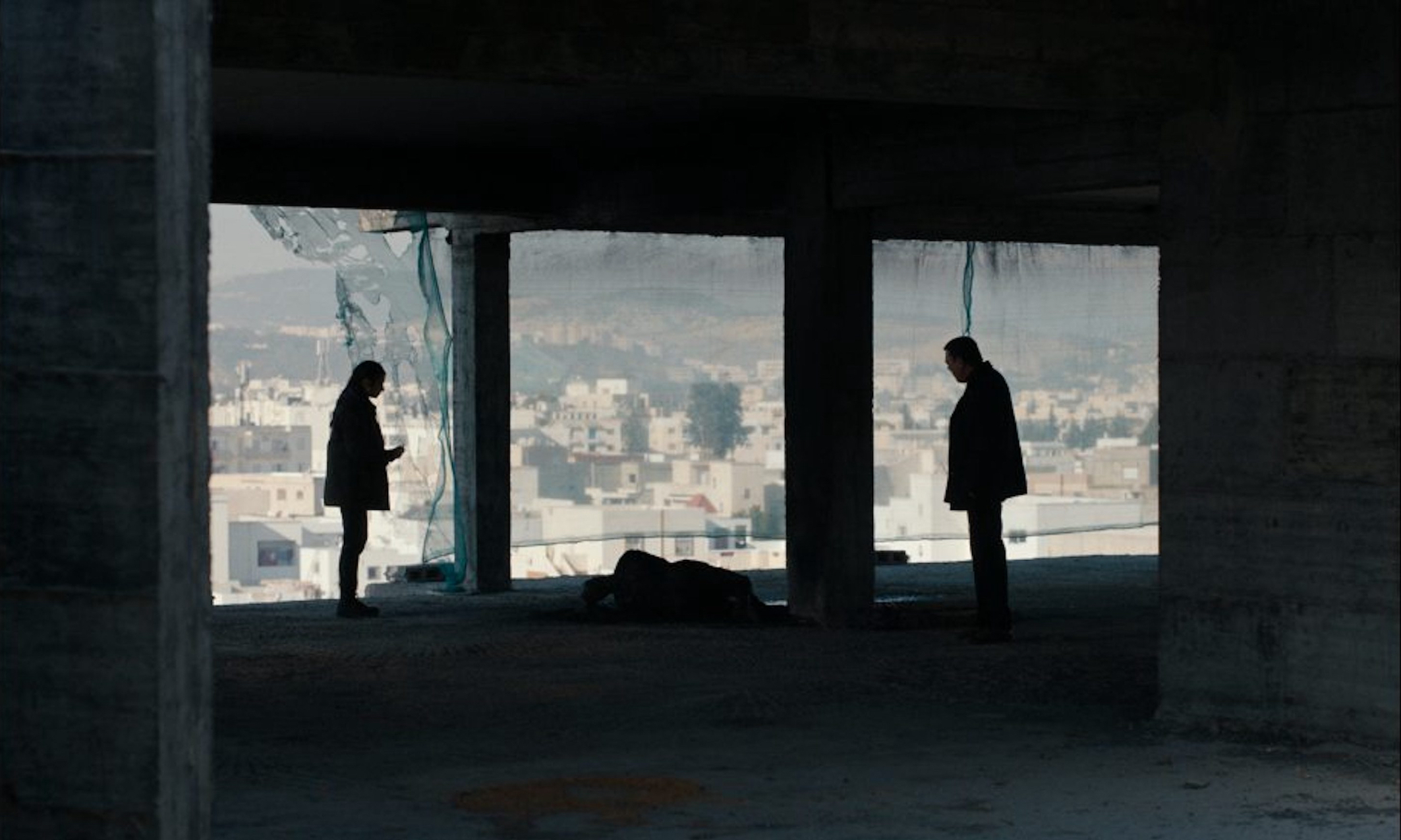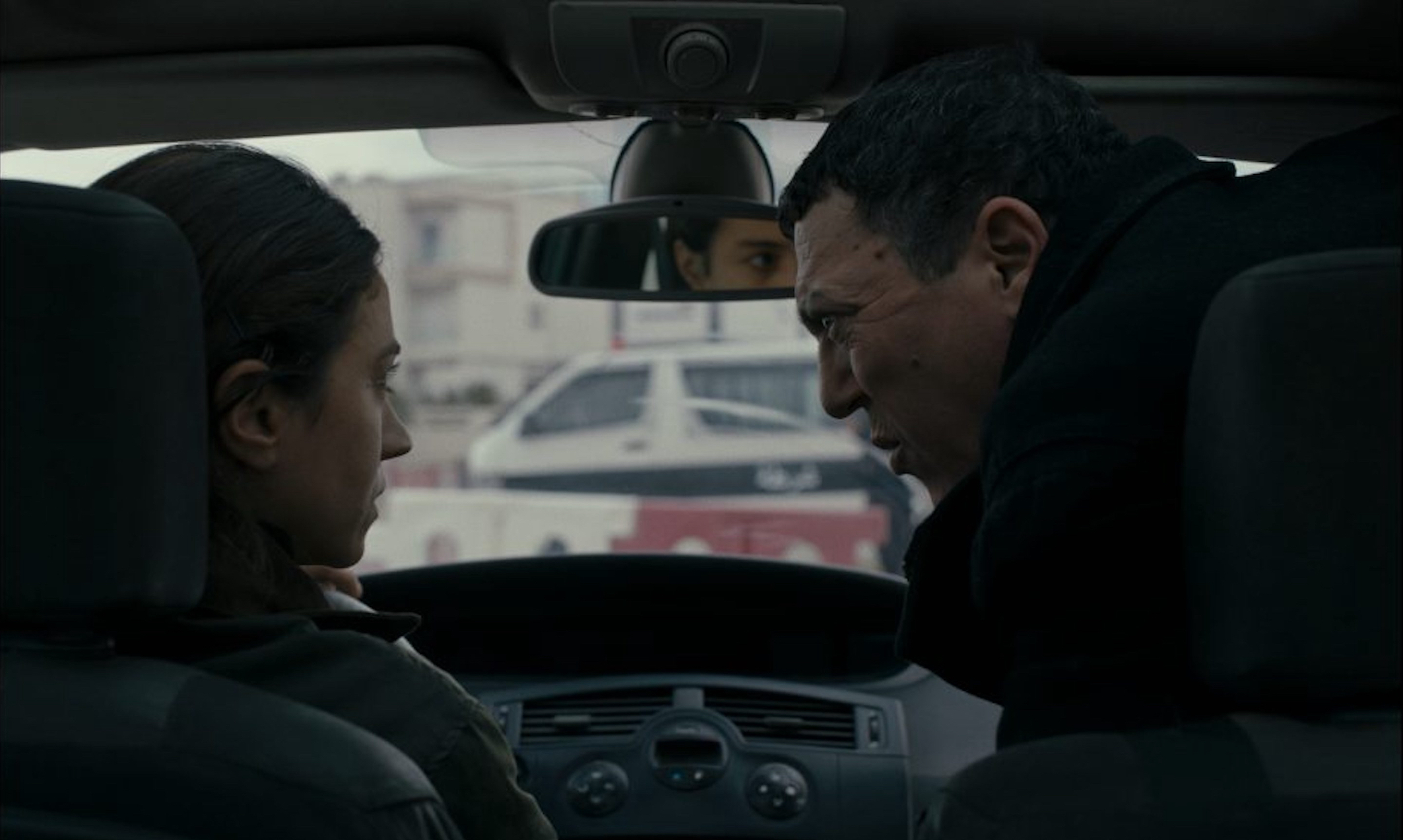
A still from ‘Ashkal.’ (Credit: ©Supernova Films)
BEIRUT — Perhaps a few people outside Tunisia remember Mohammed Bouazizi. The 26 year old set himself alight on Dec. 17, 2010, to highlight the anguish his countrymen were undergoing. When he died on Jan. 4, 2011, Tunisians were on the streets demanding change. On Jan. 14, longtime autocrat President Zine al-Abidine Ben Ali fled to Jeddah, Saudi Arabia. The Arab Spring had won a victory.
Bouazizi’s self-immolation was not an isolated incident. Tunisian writer-director Youssef Chebbi says that for a time hundreds of Tunisians set fire to themselves, yearly. Their names are not widely reported. Chebbi recalls that just before he started shooting his latest feature, Ashkal (Forms), Tunis witnessed a spate of immolations.
“Self-immolation has become so commonplace that it’s lost its impact,” Chebbi remarked in 2022, shortly before his film premiered at Cannes’ Directors’ Fortnight. “Society no longer wants to see it, understand it or recognize how someone can reach a point of such despair.”
With Ashkal in the midst of its theatrical run in Beirut, the writer-director chatted with L’Orient Today about a film deeply rooted in Tunisia, which he says is not about his country’s 2011 revolution.
Neo-noir and narrative misdirection
Fiery self-sacrifice is central to the narrative and formal features of this ambitious neo-noir, which Chebbi co-wrote with François-Michel Allegrini. Neo-noir refers to the resurgent genre that audiences have associated with movies of black-and-white screen actors like Humphrey Bogart. Like the hard-boiled detective fiction that inspired it, film noir stylishly muddies the waters of heroism and villainy with cynicism and ambivalence. Its formalized narrative alludes to human experience more realistically than cinema’s morality tales had.
 Fatma Oussaifi in a still from ‘Ashkal.’ (Credit: ©Supernova Films)
Fatma Oussaifi in a still from ‘Ashkal.’ (Credit: ©Supernova Films)
Since early this century the MENA region’s independent filmmakers have borrowed genre elements to bring structure and energy to their stories. Using genre codes can lighten the narrative load for independent filmmakers aspiring to work with novelistic themes — tangles of individual desire, family, societal and religious pressure, economic and political exploitation. Some powerful cinema has emerged from efforts to emulate Italian neorealism, but what more often issues is work that’s morally commendable but stylistically formless, frequently sodden with melodrama.
Ashkal is distinct. Rather than borrowing genre elements, it embraces noir, and is unreservedly successful in using the police procedural as a lens to gaze into the Tunisian condition. The early acts of the film scrutinize the viscera of the post-revolutionary country through its police department.
“I was interested to see if we could make a genre film — combine genre’s universal codes with motifs that you can only find in Tunisia,” Chebbi says from Paris, where his film has opened in cinemas. “This was one of our main ideas, but genre was also a means to work on something else, something more abstract, that I wanted to film in Tunis. It’s something that the city transmits, a weird sensation that we feel. This strangeness made me think about genre film, about putting characters into this maze, looking for something.”
In Ashkal a couple of cops, Fatma and Batal (Fatma Oussaifi and Mohamed Houcine Grayaa) investigate the death of a man who set himself on fire. The coroner notes that the corpse bears none of the incidental injuries that terminal burn victims inflict upon themselves as they flail about, trying to escape the pain. It seems this man was calm, as if welcoming the agony. The plot thickens when video footage shows a second figure had had contact with the victim immediately before he was engulfed in flames.
The cops learn that the scene of the death, a Tunisian neighborhood called the Gardens of Carthage, had been the site of earlier immolations — of which Fatma and Batal had not been informed. When they follow the leads, the trail takes them to a wealthy family close to the ruling elite. The investigation collides with Fatma and Batal’s boss, who has been busily burying these cases of immolation.
The principal location of Ashkal, the Gardens of Carthage, looms large in this story. It has a journalistic backstory. Close to the presidential palace, this exclusive enclave for the country’s political and economic elite has been modeled on the neo-liberal landscapes of Gulf cities like Dubai. During Chebbi’s shoot the district had the surreal air of an abandoned construction site or extravagant film set — a comparison echoing descriptions of Beirut’s Solidere development in the late 1990s.
 The unfinished architecture of the Gardens of Carthage quarter is treated like a character in ‘Ashkal.’ (Credit: ©Supernova Films)
The unfinished architecture of the Gardens of Carthage quarter is treated like a character in ‘Ashkal.’ (Credit: ©Supernova Films)
This enclave is situated on the ruins of ancient Carthage, whose archeological importance is so immense that property development had been forbidden there. Construction began in 2003, but with the collapse of Ben Ali’s regime the sleaze underlying the project was aired and a court injunction stopped it in 2011. Some suspects followed Ben Ali’s family into exile. Some contractors went to prison. Some cases remain open. Construction has since resumed.
“Everything [in the story] came from the neighborhood itself,” Chebbi says, “from the buildings, the architecture, the streets. It was empty and kind of hidden. It’s like the buildings themselves are staring at you.”
Fatma and Batal’s bosses’ hostility to their investigation also has a backstory.
Fatma’s boss sees her as a traitor because her father is one of the 2011 revolutionaries, determined to root out the corruption hardwired into the Tunisian police establishment. Since it looks as though her boss is laboring to cover up a series of gruesome homicides implicating members of the political class, it looks like Fatma’s dad may have a point. Batal’s role, depicted with sullen grace by Grayaa, is more nuanced. Since he emerged from the Ben Ali-era establishment, his colleagues treat him as one of their own; a devout Muslim and family man, his relationship with Fatma is one of a protective older brother. It turns out his position between the old regime and the new is more complex than it appears.
Chebbi embraces his film’s neo-noir label, but he’s less comfortable with critics focussing on the political side of the narrative.
“For me, this film is really a product of imagination, pure fiction,” he says. “Of course, it takes inspiration in Tunisian realities. When we see an image of this burning body, we immediately think of the revolution, but this movie is not an homage to the revolution. Those who read Ashkal as a political movie are missing the point.”
He pauses. “The image of self-immolation is an iconic one. It transcends reality.”
 Fatma Oussaifi and Mohamed Houcine Grayaa in a still from ‘Ashkal.’ (Credit: ©Supernova Films)
Fatma Oussaifi and Mohamed Houcine Grayaa in a still from ‘Ashkal.’ (Credit: ©Supernova Films)
Genre as pretext
By the final act of Ashkal, the noir’s police procedural has unraveled. The plot’s nighttime resolution takes Batal and Fatma in different directions. The contradictions in Batal’s character lead to violence, but off-frame. The camera finds Fatma gazing out a window that frames the landscape of the Gardens of Carthage. There the protagonist witnesses something in the distant darkness.
Another director might have chosen this as the film’s closing shot. It would have nicely toppled the police procedural’s narrative premises — that uncovering facts will solve a mystery.
Chebbi uses the nighttime tableau to introduce an apocalyptic finale, which provokes rather different questions.
“For François and me, the investigation is the pretext for us to dig deeper into something else,” Chebbi says. “That’s why the investigation stops very quickly.”
He pauses. “For me, the idea was to speak about the specificity of this place, to try to make the location a character, to give these buildings a perspective of the city, of society, of religion.
“This film tries to speak about something underlying reality — whether Batal and Fatma’s investigation or the state’s police reforms. Everyone is trying to find the truth, but only Fatma has some connection with what’s underneath. At the end, she witnesses something.
“It might be a catastrophe or a miracle,” he smiles. “For me it’s important that viewers interpret the ending as they see it.”
Ashkal is screening exclusively, perhaps briefly, at Grand Galaxy Cinemas.
